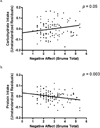Pre-meal affective state and laboratory test meal intake in adolescent girls with loss of control eating
- PMID: 23603224
- PMCID: PMC3686880
- DOI: 10.1016/j.appet.2013.03.018
Pre-meal affective state and laboratory test meal intake in adolescent girls with loss of control eating
Abstract
Loss of control eating confers risk for excess weight gain and exacerbated disordered eating. Affect theory proposes that loss of control eating is used to cope with negative mood states. Self-report data suggest that negative affect may contribute to the etiology of loss of control eating, but this theory has not been well-tested using laboratory paradigms. We examined associations between pre-meal affective states and intake during a laboratory test meal. One-hundred and ten adolescent girls with reported loss of control eating whose body mass index fell between the 75th and 97th percentile for age and sex completed state mood ratings prior to a test-meal. Results indicated that pre-meal state negative affect was associated with greater carbohydrate and less protein consumption, as well as greater snack and dessert and less fruit and dairy intake. All girls experienced significant decreases in negative affect from pre- to post-meal, but intake during the meal was unassociated with post-meal affect. In support of affect theory, negative affective states reported among girls with loss of control may be a driving factor for increased energy-dense food intake, which may play a role in excess weight gain.
Published by Elsevier Ltd.
Figures


Similar articles
-
Effect of adapted interpersonal psychotherapy versus health education on mood and eating in the laboratory among adolescent girls with loss of control eating.Int J Eat Disord. 2016 May;49(5):490-8. doi: 10.1002/eat.22496. Epub 2016 Jan 21. Int J Eat Disord. 2016. PMID: 26790360 Free PMC article. Clinical Trial.
-
Examination of the interpersonal model of loss of control eating in the laboratory.Compr Psychiatry. 2017 Jul;76:36-44. doi: 10.1016/j.comppsych.2017.03.015. Epub 2017 Apr 3. Compr Psychiatry. 2017. PMID: 28410467 Free PMC article.
-
Lack of effect of high-protein vs. high-carbohydrate meal intake on stress-related mood and eating behavior.Nutr J. 2011 Dec 12;10:136. doi: 10.1186/1475-2891-10-136. Nutr J. 2011. PMID: 22152216 Free PMC article. Clinical Trial.
-
Laboratory assessment of the food intake of children and adolescents with loss of control eating.Am J Clin Nutr. 2009 Mar;89(3):738-45. doi: 10.3945/ajcn.2008.26886. Epub 2009 Jan 14. Am J Clin Nutr. 2009. PMID: 19144730 Free PMC article. Clinical Trial.
-
The effects of negative and positive mood induction on eating behaviour: A meta-analysis of laboratory studies in the healthy population and eating and weight disorders.Neurosci Biobehav Rev. 2015 Oct;57:299-309. doi: 10.1016/j.neubiorev.2015.08.011. Epub 2015 Aug 20. Neurosci Biobehav Rev. 2015. PMID: 26299807 Review.
Cited by
-
Self-efficacy beliefs and eating behavior in adolescent girls at-risk for excess weight gain and binge eating disorder.Int J Eat Disord. 2013 Nov;46(7):663-8. doi: 10.1002/eat.22160. Epub 2013 Jul 23. Int J Eat Disord. 2013. PMID: 23881587 Free PMC article.
-
An examination of the associations between pediatric loss of control eating, anxiety, and body composition in children and adolescents.Eat Behav. 2018 Aug;30:109-114. doi: 10.1016/j.eatbeh.2018.06.007. Epub 2018 Jun 27. Eat Behav. 2018. PMID: 29990651 Free PMC article.
-
Perceived Family Functioning in Relation to Energy Intake in Adolescent Girls with Loss of Control Eating.Nutrients. 2018 Dec 2;10(12):1869. doi: 10.3390/nu10121869. Nutrients. 2018. PMID: 30513811 Free PMC article.
-
The association between preconception loss of control over eating and depressive symptom trajectories from childhood through first pregnancy.Int J Eat Disord. 2023 Sep;56(9):1814-1819. doi: 10.1002/eat.24004. Epub 2023 Jun 2. Int J Eat Disord. 2023. PMID: 37264988 Free PMC article.
-
Associations between latent trait negative affect and patterns of food-intake among girls with loss-of-control eating.Int J Eat Disord. 2020 Apr;53(4):618-624. doi: 10.1002/eat.23253. Epub 2020 Feb 27. Int J Eat Disord. 2020. PMID: 32107799 Free PMC article.
References
-
- Adam TC, Epel ES. Stress, eating and the reward system. Physiol Behav. 2007;91(4):449–458. 10.1016/j.physbeh.2007.04.011. - PubMed
-
- American Psychiatric Association. Diagnostic and Statistical Manual of Mental Disorders, 4th edition, test revision (DSM-IV-TR) Washington, DC: American Psychiatric Association; 2000.
-
- Beck AT, Steer RA, Brown GK. Manual for the Beck Depression Inventory-II. San Antonio, TX: Psychological Corporation; 1996.
-
- Behrens JT. Principles and procedures of exploratory data analysis. Psychological Methods. 1997;2(2):131–160.
Publication types
MeSH terms
Grants and funding
LinkOut - more resources
Full Text Sources
Other Literature Sources

